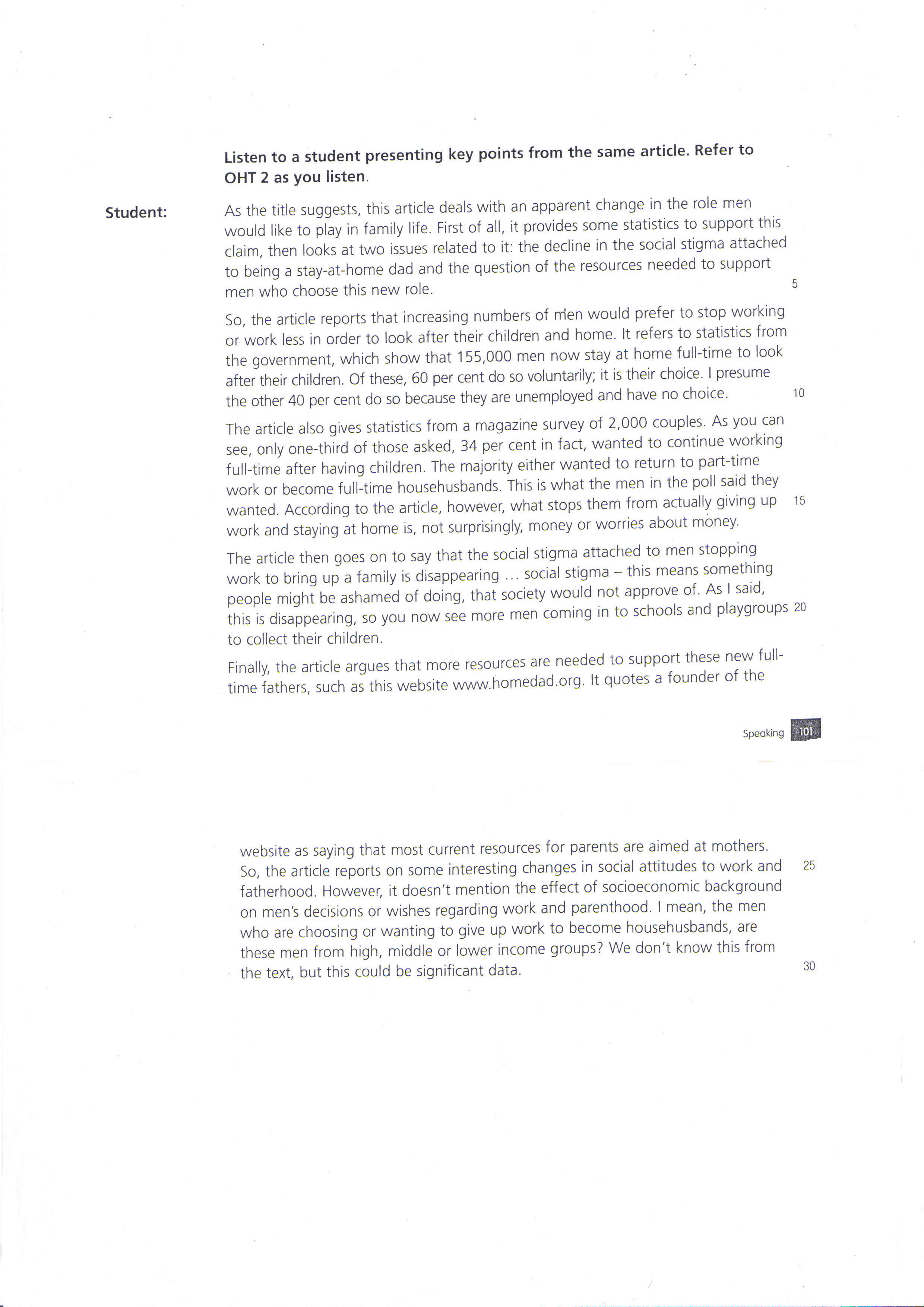Roles in theúmily transcript

Listen to a student presenting key points from the same article. Refer to OHT 2 as you listen
Student:
As the title suggests, this article deals with an apparent change in the role men would like to play in family life. First of all, it provides some statistics to support this claim, then looks at two issues related to it: the decline in the social stigma attached to being a stay-at-home dad and the question of the resources needed to support men who choose this new role. 5
So, the article reports that increasing numbers of rrlen would prefer to stop working or work less in order to look after their children and home. It refers to statistics from the government, which show that 155,000 men now stay at home full-time to look after their children. Of these, 60 per cent do so voluntarily; it is their choice. I presume the other 40 per cent do so because they are unemployed and have no choice. 10
The article also gives statistics from a magazine survey of 2,000 couples. As you can see, only one-third of those asked, 34 per cent in fact, wanted to continue working full-time after having children. The majority either wanted to return to part-time work or become full-time househusbands. This is what the men in the poll said they wanted. According to the article, however, what stops them from actually giving up 15 work and staying at home is, not surprisingly, money or worries about money.
The article then goes on to say that the social stigma attached to men stopping work to bring up a family is disappearing ... social stigma - this means something people might be ashamed of doing, that society would not approve of. As I said, this is disappearing, so you now see morÄ™ men coming in to schools and playgroups 20 to collect their children.
Finally, the article argues that morÄ™ resources are needed to support these new full-time fathers, such as this website www.homedad.org. It guotes a founder of the
Speaking

website as saying that most current resources for parents are aimed at mothers.
So, the article reports on some interesting changes in social attitudes to work and 25 fatherhood. Flowever, it doesn't mention the effect of socioeconomic background on men's decisions or wishes regarding work and parenthood. I mean, the men who are choosing or wanting to give up work to become househusbands, are these men from high, middle or lower income groups? We don't know this from the text, but this could be significant data. 30
Wyszukiwarka
Podobne podstrony:
Log in or Sign up s^ares O Ol ES Q @Clouvider *HappyNewYear from the team at Clouvider Limited! Here
5 10 topili To persuade others in an effective way (to do anything), you have to be fully corwinced.
66 (160) 126 The Viking Age in Denmark have becn fouhd (Figs 32-3).7 They stem from thc same provinc
47 (269) 88 The Yiking Age in Denmark FigurÄ™ 24 Reconstruction of ninth-century house from the centr
2. Language lecturers. §21 1. In case of examination failure a student has right t
skanowanie0084 (2) •fwl dictation, ttt dicto-comp - students listen to the passage and then summaris
quebec PaulWeiskel »foiiow a- @PWeiskei08 Students in Quebec were asked to send th
CSG332 Verb Tables 321 Infinitives in -ir change stem e to i, e to ie and i, and o to ue and u: pedi
CSG332 Verb Tables 321 Infinitives in -ir change stem e to i, e to ie and i, and o to ue and u: pedi
24064 img456 (6) O Ali in a days work listening 11 Listen to Darina and complete the notes. 1
ErrorBig There was an error in your design: Variables to big to fił in memory (too many porto).
furby kolorowanka (22) 6 4 a2. BIRTHPAY BLOW-OUT Comect tlić dot& in min ber order to aee a bi
helicoptermaze Directions: Tiy to find the path from the start to the finish in the maże below.
więcej podobnych podstron